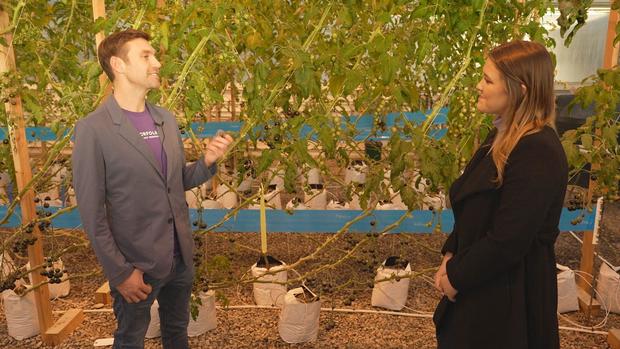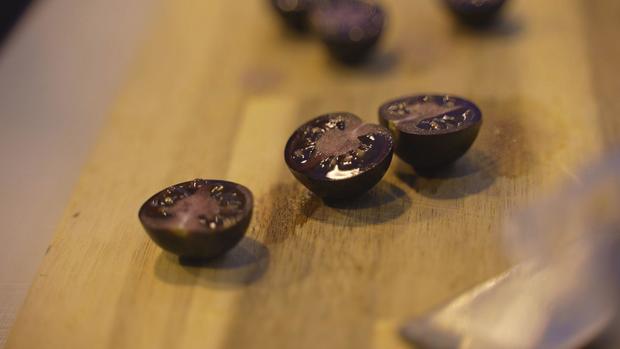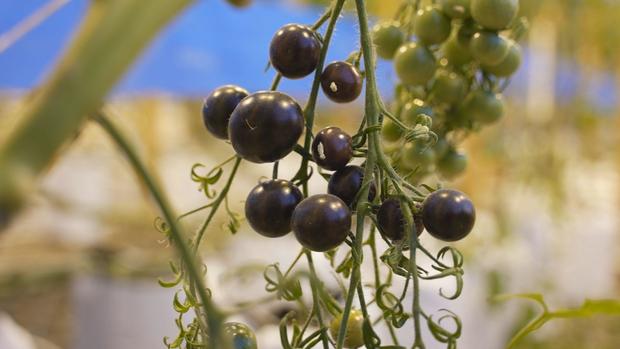Purple tomatoes? Why a California company is planting seeds of nutrition, innovation with bioengineered fruit
DAVIS -- Biting into one of Norfolk Healthy Produce's purple tomatoes, the taste is as vibrant as the colorful fruit fresh-picked off the vine.
"This is the lab where we are developing new varieties of tomatoes. We are producing seeds and then trialing them," said CEO Dr. Nathan Pumplin, walking CBS13 through their greenhouse in Woodland.
In truth, it is better described as a science lab.
"Through the natural ripening process instead of turning red, they turn purple," said Pumplin, showing CBS13 one of their bioengineered cherry tomatoes.
Homegrown innovation
The purple tomato recipe is one the Davis-headquartered company has mastered.
Pumplin said they are the only scientists in the world bioengineering purple tomatoes for consumers to eat.
"We are the only company that has developed this type of tomato. All of the producers right now work with licenses from our tomato," he said.
They have partner growers in Missouri, North Carolina and Virginia who are taking the products to scale in their respective regions. Norfolk Healthy Produce has yet to find a California farm to help them scale and sell the tomatoes locally.
"We were founded to bridge a gap and take something from the lab, from a scientist's discovery, and get it into the grocery store, into people's shopping cart and on the dinner table," Pumplin said.
Though some people may have come across a purple tomato here and there, be it in a store or a garden, after biting into it, Pumplin said they will notice that those tomatoes are still red.
This is not the case for those grown by Norfolk Healthy Produce. They are positively purple through and through.
"Our founder, Professor Cathie Martin, developed a special way using bioengineering to make a high antioxidant purple tomato," Pumplin said. "She inserted, using this natural process, genes from snapdragon into the tomato. She did that one time and found, low and behold, you get a purple tomato."
Snapdragon is a flower with a lovely purple hue that now belongs to the tomatoes grown by Pumplin and his team in Woodland.
The science behind it has been decades in the making for Professor Martin.
Purple has its plus
So why purple?
"It has the nutrients of a blueberry, these special antioxidants," Pumplin said. "The purple pigments, which are called anthocyanins, have a number of unique health benefits associated with them. Anti-inflammatory activity, anti-cancer properties, they're good for heart health, lung health and most of us just don't eat enough of them."
Ripe with health benefits, Pumplin said they are more nutritious than your run-of-the-mill red tomato.
"What's great is this is now part of the tomato genetics. We don't need to inject anything into the tomato. It breeds the same as the 30,000 other genes that tomatoes have," he said.
The purple tomato has a rich and savory taste, much more bold and explosive than the sweetness of a red cherry tomato.
However, the company is focused on much more than flavor with its fruit.
A taste of the future
"For thousands of years, people have been developing better fruits and vegetables," Pumplin said, "and there's a huge opportunity for biotechnology to play a role in increasing sustainability."
Pumplin added that bioengineering, over the next decade or more, has the potential and promise to truly drive food sustainability and combat climate change.
"I will feel very proud if we can look back on this and say the purple tomato is the tomato that launched a thousand ships, and now we have dropped the greenhouse gas emission from food production by 50% partly because of biotech's role," Pumplin said, speaking on his goals for the company.
So it is not just a treat to the taste buds but a budding food science that is already breaking ground.
"The more people see this and see the benefits and become comfortable with it, the more we will be able to get the benefits as a society," Pumplin said.
Norfolk Healthy Produce is working to one day scale their purple tomatoes nationally, but said it is also looking to genetically modify other fruits and vegetables in the future.
They also want to grow larger-sized purple tomatoes to add to their current collection of cherry tomatoes. They plan to create a processing tomato as well for purple sauces, juices and salsas.
An appetite for GMOs?
CBS13 asked Pumplin if consumers want this. He said that based on their extensive market research, the answer was clear: yes.
"Eighty percent of people say, 'I'm fine with GMOs as long as it is something that benefits me,' " Pumplin said. "We as Americans have been eating GMOs in our food for over thirty years. There is no single example of any health negative consequence coming from GMOs."
The important distinction for the consumer is that this is not a fruit that is artificially injected with color. It is genetically modified to grow purple naturally.
"We are crossing purple tomatoes with red tomatoes and constantly improving to get better tomatoes every year," Pumplin said.
They're not injected with pesticides, Pumplin added, and are produced organically.
The purple tomatoes have been properly reviewed and approved by both the USDA and the FDA. They are now cleared to sell to consumers.
Pumplin said that January has been an exciting month for Norfolk Healthy Produce.
Their purple tomatoes will hit retail stores in select regional chains in the Southeast this month. Also, for the first time, their purple tomato seeds are now available for purchase on their website so those with a green thumb can grow the purple gems in their own backyard.
To buy the seeds and learn more about the science behind it all, visit the Norfolk Healthy Produce website.






